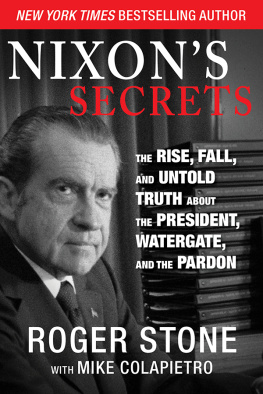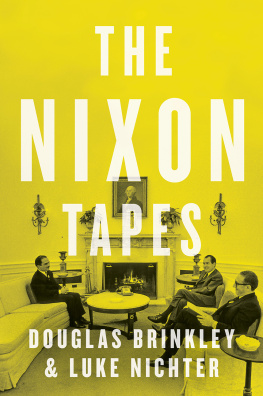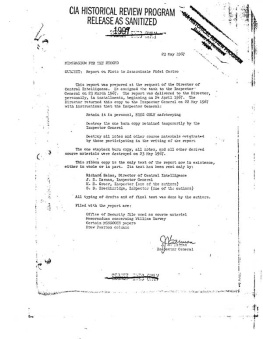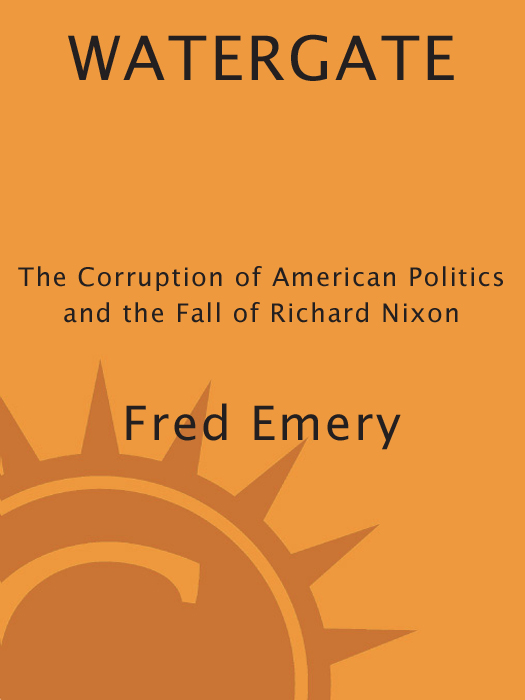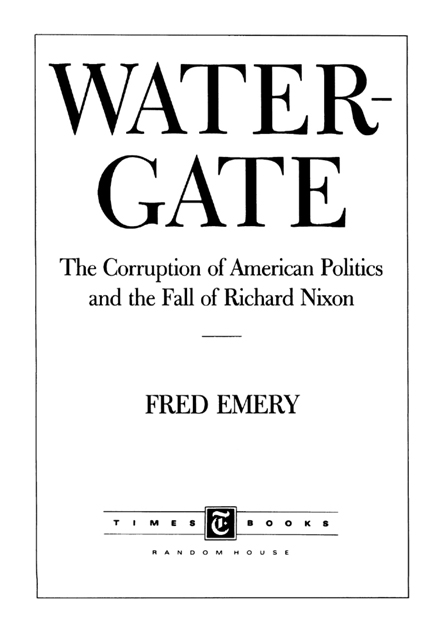Copyright 1994 by Fred Emery
All rights reserved under International and Pan-American Copyright Conventions. Published in the United States by Times Books, a division of Random House, Inc., New York. Originally published in Great Britain by Jonathan Cape, Ltd, London.
Library of Congress Cataloging-in-Publication Data
Emery, Fred.
Watergate : the corruption of American politics and the fall of Richard Nixon / by Fred Emery.
p. cm.
Includes bibliographical references (p.)
eISBN: 978-0-307-82474-5
1. Watergate Affair, 19721974.
2. Nixon, Richard M. (Richard Milhous), 1913 I. Title.
E860.E47 1994
973.924092dc20 93-44736
v3.1
To Marianne
Acknowledgments
The idea of retelling the Watergate story for a new generation originated with the fall of another leader, Margaret Thatcher. It was while making a BBC-TV Panorama program in 1990 about the crisis that ousted the British prime minister that Phil Craig, a brilliant young producer, listening to my Watergate stories, said, We have to tell it again. For his generation of thirty-somethings, Watergate loomed important, but as distant as the Napoleonic Wars.
Craig, who has now moved on to bigger things, took the idea to Brian Lapping Associates, which took it to the BBC and to the Discovery Channel. Viewers will now judge whether the series Lapping Associates has made for the twentieth anniversary of Richard Nixons fall can repeat the success of its award-winning The Second Russian Revolution. I am indebted to Brian Lapping for his encouragement to write a fresh history of Watergate based on my own personal experience and research.
I was privileged as a foreign correspondent to come straight from reporting the Vietnam and Cambodia fighting to Washington and then spend seven years there, which included the bulk of the Nixon presidency. I owed the position to two outstanding foreign editors of The Times of London, Iverach McDonald and E. C. Hodgkin. The newspapers editor, William Rees-Mogg, though at times alarmed by my Nixon coverage, still graciously maintained me in the post. At the time it was the best story a reporter could have.
Re-interviewing twenty years on, the moment I most cherish came in a long debriefing with H. R. Haldeman a few months before he died in 1993. In a passage not retained for the TV series he was explaining his long-held line that what he had been involved in was political containment of the scandal to the Watergate break-in alone, not a criminal cover-up of all the administrations offenses. He suddenly suggested my expression betrayed some skepticism. I tried explaining the difficulty I had with his distinction. He smiled and said winningly that it was a concept Ive never gotten across to anybody, including even my wife, who says I just dont understand what youre saying. He added: My wife felt definitely that I had to be convicted that I was better off not being pardoned and I now believe she was right. This was not the Haldeman of the stereotype, and it was fine tribute to Jo, his wife of forty-four years.
Encouragement for the book came from a number of friends. From Johnnie Apple and David Brinkley I reached Ashbel Green of Knopf. Debbie Owen gave me sage advice and Peter Osnos, publisher of Times Books, had the courage to decide the book was a go. En route I had a boost when John Tusa read the first couple of chapters; and Marianne Emery, my lifes support, was ever wonderful in demanding the next chapter. She lived Watergate twice over.
I was blessed with Chuck Elliott of Jonathan Cape in London. As an editor he can have few peers: unfailingly encouraging, gifted with lucidity, and, as all who know him agree, a man of rare calm and quiet humor, a perfect foil to my (at times) frenetic approach.
People who have helped with the book at key stages are: Sarah Hume, a former BBC producer in Washington, D.C.; the expert staffs of the National Archives, both in the capital and at the Nixon Project in Alexandria, Virginia, in particular, B. A. Scott Parham; Jackie Andrews, Lisa Gartside, and Lisa Soverall at Brian Lapping Associates. I ask British readers to be forbearing with the American spellings used for publishing expediency: I have insisted on avoiding Americanisms incomprehensible outside the United States. All the conclusions and mistakes are my own.
Woodsyre, London
1994
Contents
Introduction
Watergate is a compelling story of botched government that in two years went from the implausible to the unthinkablethe first resignation in history of a U.S. president. If it was a self-destruct tragedy for Richard Nixon, for the American people it was a drawn-out ordeal that tested the robustness of democratic processes. Despite some alarms, institutions held steady, law was upheld, and a chastened republic survived.
Modern leaders have had their terms of office involuntarily terminated in a number of ways. In the Communist party of the former Soviet Union, Nikita Khrushchev was simply replaced by a secret politburo vote; in its dog days, Mikhail Gorbachev was deposed in a coup, restored, then found that the entity for which he was president, the USSR, had itself been dissolved, and he was left officeless. Equally firmly, British Prime Minister Margaret Thatcher, who had never lost a vote in Parliament and had won three elections, was, when her party feared she might lose the fourth, persuaded to step downin what she has since reviled as an act of treachery by Cabinet colleagues.
In the United States, no living president had involuntarily given up office until the thirty-seventh president, Richard Nixon. He resigned two and a half years short of completing his second term rather than risk being removed from office by a congressional vote for impeachment.
Myth would have it that what Nixons men did was no worse than their predecessors, except that they were caught. Or that Nixon, admittedly a difficult character, fell victim to the vicious partisanship of the opposition Democrats who controlled Congress. Like all myth, there is a core of truth. But the greater truth is that no president, least of all as powerful a man as Nixon, faces impeachment for purely partisan reasons or for misconduct on the level of bugging opponents. It was a pattern of malfeasance by him and his men that led to the damningand bipartisanvote in Congress. Had it not been for the defection of Republicans and pro-Nixon conservatives, he would have survived.
Watergate, the name of a luxury apartment-office complex by the banks of the Potomac River in Washington, D.C., came in the early 1970s to symbolize such an all-encompassing presidential scandal that, twenty years on, it has gone not just into the language but into many languages. The suffix -gate now routinely connotes government cover-up and almost invariably the corruption of power. But this, notwithstanding Iran-, Iraq-, and now Whitewater-, is still the mother of all gates.
When five men hired by Nixons election committee and equipped with electronic bugging devices were caught red-handed by police in the Democratic Party headquarters at the Watergate on June 17, 1972, it might have been only a third-rate burglary attempt. But it was also the tip of an iceberg of lawless abuses of office on which the Nixon presidency was to founder.


